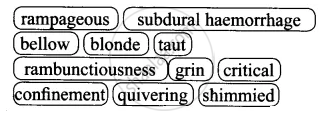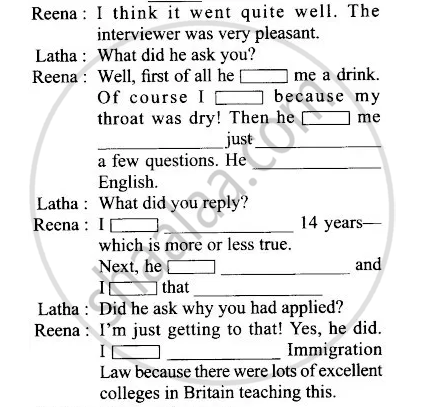Advertisements
Advertisements
प्रश्न
Now that you have seen some techniques for creating vivid images with language, try to compose a poem or write a short descriptive paragraph using similes and colourful expressions. Work in pairs if you prefer. Then read it out to the class.
Choose one of these themes: waves, stars and moon, rocks, sunset or sunrise.
Consider the following for your chosen theme:
• What does it look like?
• What does it feel like?
• What does it sound like?
• How does it move?
• Where do we see it?
• When do we see it?
उत्तर
We were sitting atop the famous hillock of the city to have an ideal view of the setting sun in the backdrop of the Kanha lake. It was around 6:30 pm. The sun was turning into a pale fireball. Then it turned bright orange and a little bit oval. The horizontal sky was coloured in different hues of the rainbow. It seemed as if the nature was making a masterpiece on the largest canvas available. Birds flying towards their nest created the perfect dramatic effect as if they were celebrating the march of sun in chorus. Finally, everything became much darker and a faint glimmer of dark orange colour was visible in the far western sky.
APPEARS IN
संबंधित प्रश्न

a) This is the other word for trembling
(b) This is used for smile
(c) You call a person this if he/she has pale gold coloured hair.
(d) This is a quality which relates to high energy and noise
(e) This is related to dancing or moving in a way that involves shaking your hips and shoulders
(f) This is to express a tendency to show violent and wild behaviour often causing damage
(g) We use it for a condition which is serious, uncertain and dangerous
(h) This is a state in which one is forced to stay in a closed space
(i) This is a medical condition involving bleeding in the brain
(j) It is a loud, deep shout to show anger.
(k) This is a condition when the rope or leash is stretched tightly
Answer the following question briefly.
How did John’s first meeting with Jessie’s father go? What did the author tell him?
Answer the following question briefly.
Describe the two roads that the poet comes across.
Working in pairs give antonyms of the following words.


Teacher/ Student to read out the first part given . After you listen, answer the following questions :
Nuclear war has broken out in Europe. A school in England has been evacuated by airplane to an unknown destination. While flying over a tropical region, the plane is shot down and it bursts into flames , but the body of the plane containing the passengers falls to earth safely. A few boys (Ralph, Jack, Roger, Simon, Piggy and others) manage to scramble out. They have landed on an unnamed island which has coral reefs, beaches, caves and fruit trees. The novel tells their story.
a. What do you think happened to the boys and the plane they were flying in?
b. What happened to the other part of the plane?
c. How did Ralph attract the attention of the other boys?
d. What were the names of the first three boys who came to the meeting?
e. Why do you think the groups of boys were marching in two parallel lines?
f. Do you think there were any adults on the island? Why/ Why not?
g. Can you predict what happened to the boys next? For example, how did they organise themselves? What about shelter and food?
Look at the pairs below. Draw a sketch to show the difference in meaning, as in the example:

- (a) cloth
(b) a cloth - (a) rubber
(b) a rubber - (a) lamb
(b) a lamb - (a) glass
(b) a glass
As a class, you will need to follow these steps
a. Decide the length of your programme
b. Select two lively presenters whose job is to:
• discuss and agree with other students on their proposals for the programme.
• fix the duration of each item.
• ensure that the programme has enough variety of content.
• decide the sequence of items.
• supervise the script for each item.
• present the programme in a lively manner.
Now enjoy performing/ watching the show.
1 Read the conversation between a young boy and his mother. The boy is determined to go to camp, despite his mother's refusal to let him (from George Layfon's short story "The Holiday").
It wasn't fair. Tony and Barry were going. In fact, nearly all of them in Class
Three and Four were going, except me. It wasn't fair. Why wouldn't my mum let
me go?
(a) "I'vetoldyou. Youarenotgoingcamping. You're far too young."
Huh! She said thatlastyear.
"You said that last year."
"You can go next year when you're a bit older."
She said that last year, too.
"You said that last year and all."
"Do you want a clout?"
"Well you did, Mum, didn't you?"
(b) "Go and wash your hands for tea."
(c) "Aw, Mum, everybody else is going to school camp. Why can't I?"
(d) "Because you're going to Bridlington with me and your aunt Doreen, like you do
every year!"
Ohl Every year my mum, me and Aunt Doreen stay at Mrs. Sharkey's boarding
house. I suppose we'll have that same room again.
"Don't be cheeky! Mrs. Sharkey saves the room for me every year. It's the best
room in the house facing the sea."
"Aw, Mum, I never get any sleep - the sea splashing on one side."
My mum gave me a clout right across my head.
"Well, you've done it now. You've dislocated my jaw- owl"
She clouted me again, right in the same place.
"It's not fair. Tony's mum and dad are letting him go to school camp, and
Barry's going too. Why don'tyou let me go?"
She suddenly bent down and put her face right next to mine, right close. She
made me jump.
(e) "Now listen to me, my lad. What Tony's mum and dad do, and what Barry's
mum and dad do, is their look out. You will come with me and your Auntie
Doreen to Bridlington and enjoy yourself, like you do every year!"
1.1 Suppose Tony overheard this conversation, and wrote a letter to Barry.
Write and complete Tony's letter for him.
Dear Barry,
It's just two weeks more for our school camp! I can't wait to have a great time with
our class mates. I was hoping you, George and I get to share a tent together! But I
was at George's place and got to hear what his mother felt about our trip.
To start with his mother said he wasn't going camping. adding that he was far
too young for it. George reminded his Mum that she had said that the previous
year.
She felt that (a)____________________________________________________________________ older. He protested that she had said the previous year, too. To this, she simply ordered (b)_______________________________________________________________________ for tea. He wanted to know why (c) _________________________________________________________ when every body else, was going. She reasoned with him saying (d)_______________ George objected to being disturbed by the splashing sea, waves. But, his mother clouted him twice and in a threatening manner, told him (e)______________________ _________________ so, that's it. Probably, George won't be with us
Affectionately
Tony.
Reported speech in Extended practice.
Read the dialogue between Mr Coomer (Mr C), the British Scholarship Officer, and an applicant, Miss Reena Banerjee (R).
Mr C : Come in, Miss Banerjee.
R : Thank you.
Mr C : Please sit down. Can I get you a cup of coffee or a cold drink?
R : Yes thank you. A cold drink, please.
Mr C : I’m just going to ask you a few questions. How long have you been studying English?
R : I’ve had private as well as school lessons for 14 years.
Mr C : Just as background information, what do you do in your spare time?
R : I’ve always enjoyed drama, and also debating.
Mr C : Why do you wish to obtain a scholarship to study in Britain?
R : Well, I’m interested in studying Immigration Law, and there are several good colleges in Britain dealing with his.
Mr C : Very interesting. Finally, do you know that the grant only covers teaching fees?
What about your living expenses?
R : My sister will pay for my personal expenses.
Mr C : Well, Miss Banerjee, we’ll be writing to you next week. Thank you for coming.
Reena meets her friend, Latha, after the interview. She is very excited and tells Latha exactly what happened. Fill in the spaces using reported speech.
Fill in the [boxes] with reporting verbs.


As children of the world, you have a role in helping to solve the problems prevalent in society. In groups or four, prepare a short skit on any one problem and present it in front of the class.
